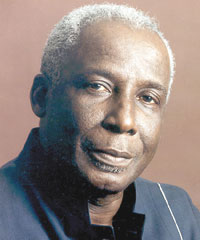His is another of the stories of country come to town; the boy who left his dirt poor rural community for the brighter lights of his country’s tourist city of Montego Bay for his secondary schooling, who ended up an Oxford Rhodes scholar and then becoming head of the Caribbean’s premier institution of higher learning, the University of the West Indies.

But those were only the milestones etched in the journey of Rex Nettleford who died in a Washington DC hospital Tuesday evening February 2, just hours before his 77th birthday. Jamaica’s prime minister, Bruce Golding, described his life’s work as seeking “the emancipation of the Caribbean colonial mind from mental slavery in its quest for identity.”
The vice chancellor emeritus of the UWI was equal parts artist and academic and the National dance Theatre Company (NDTC) which he founded in 1962, the year Jamaica gained independence from Britain, served as the stage on which his vision was made manifest.
Landmark works like The Crossing, which depicted the African European encounter of discovery, colonialism and exploitation and Court of Jah, that choreographed the Rastafari rebellion against the Babylon that arose from that encounter, synthesised his interest in political and cultural self determination, trade unionism, feminism and the academy.
It is possibly an ironic twist that the clean shaven well groomed Nettleford became indelibly etched in Rasta iconography in some places, based on his landmark work after Rastafari leaders of the late 1950s, under siege by the state and facing police repression, approached the university to conduct a study on the nascent movement.
When a group of brethren in Dominica turned out at the airport to greet him to that island some years ago, they were shocked that it wasn’t a dreadlocked bearded man who was coming to make a presentation.
While Kumina and other African spiritual retentions have featured in NDTC’s choreography it is that on Rastafari and reggae that has grasped international attention.
“The world of Rastafari has long been a ‘source of energy’ for NDTC choreographic work,” Nettleford wrote in a February 2008 tribute to Reggae Month. “In 1964 I, (after co-authoring the Report on Rastafari along with M.G. Smith and Roy Augier, colleagues from the UWI, in 1960) addressed the phenomenon of Rastafari, the source of ‘Dread culture’ in the prophetic Two Drums for Babylon, which was updated in 1980 with new music composed by Peter Ashbourne, who drew heavily on the developments in reggae by that time.”
And he seemed vindicated when Court of Jah, despite criticism became an international pick.
“Aficionados from the Marley camp felt that my choreographer lacked the muscularity of Marley’s music and did not match the effective rootsiness of Backlash, done to the Maytals score,” he wrote in the same piece. “The controversy continued for sometime after, but the work – Court of Jah – developed in stature, winning international acclaim when the NDTC appeared at City Center in New York in 1984, and later when the short-lived Clive Thompson Dance Company, based in Staten Island, danced the work, which entered that group’s repertoire, at the Lincoln Center in New York. The power and fame of Bob Marley and his music were part of that acclaim.”
It was also ironic, yet apt, that Nettleford, the academic’s academic was for many years director Extra Mural Studies, that section of the UWI which has one foot in the university and one in the community. It was here that across the Caribbean, mature students and those who had not fared sufficiently well to matriculate to mainstream courses would get the chance to qualify themselves.

It was also via the Extra Mural Department, later the School of Continuing Studies, through centres in all participating territories – campus and non-campus – that working people could being their degrees by distance learning before moving on to a campus.
Nettleford’s Trade Union Education Institute office within the School, was also the place he conducted his tutorials for Mass Communication students taking his Politics and Culture of the Caribbean course. He was not shy to use the subjective in his lectures on occasion declaring that were slave society still in existence he would merely be the headman and his students, the labouring gang.
Under his watch also, the School of Continuing studies – which recently became the UWI’s fourth campus (a virtual one) – a Women and Development Unit was created that combined education and training, community work and formative research in four Eastern Caribbean territories from WAND’s Barbados office base.
Jamaica’s culture minister, Olivia Grange in her tribute described him as “a man of great intellect and enduring vision”.
“Nettleford’s love for his country and the Caribbean was well known. He dedicated his life to the promotion of Caribbean culture and identity. For him, the Caribbean civilisation needed to be heralded to the world.”
He was cultural adviser to the prime minister, member of the Inter-American Committee on Culture, founding governor of the Canada-based International Development Research Centre, and had acted as expert/consultant to the government of Ghana, FESTAC, CARIFESTA and UNESCO.
He received Jamaica’s third highest honour, the Order of Merit, as well as the gold Musgrave Medal, the Pelican Award from the UWI Guild of Graduates, an honorary doctor of Humane letters from the University of Hartford and the Living Legend Award from the Atlantic Black Arts Festival.
Nettleford has served in an advisory capacity to several international organisations, including CARICOM, the Organisation of American States, UNESCO, the ILO, the World Bank and the International Development Research Council (IDRC) of which he is a founding director.
He entered the then University College of the West Indies in 1953 to read for a degree in History. His only time away from the institution was while on his Rhodes scholarship and he returned immediately after completing the MPhil in Political Science at Oxford.
Ralston Milton ‘Rex’ Nettleford was born on February 3, 1933 in Falmouth, Trelawny. He died at the George Washington University Intensive Care Unit in the United States where he was being treated since Wednesday, January 27, 2010 for catastrophic brain injury following a cardiac arrest.


About Mark Lee
Mark Lee has been a long-time journalist writing, editing and producing in print, radio television and new media.










